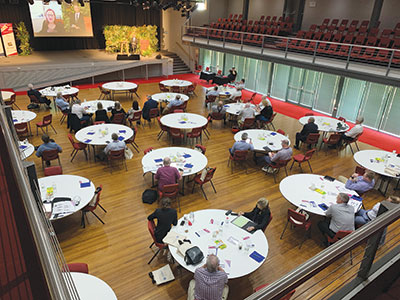Last week’s Special Local Roads and Transport Congress was a triumph – both in technological terms and the extent to which vital and pressing issues facing local government today were explored in detail.
Traditionally, the Australian Local Government Association’s (ALGA) annual November event is almost exclusively focused on roads, road safety, and transport-related matters.
When ALGA was forced to cancel its National General Assembly (NGA) in June because of COVID-19 restrictions, the Board made the decision to expand the roads congress at Wagga Wagga, New South Wales, into a two day event encompassing some of the elements of NGA.
To convene a hybrid event such as ‘Roads, Regions, Resilience’ is always to run the risk of falling between two stools.
Happily, the Wagga event did justice to all three elements – whilst exploring other issues and topics, local government has had to contend with in a year characterised by disasters and setbacks.
New president welcomed
The Congress introduced ALGA’s new President, Linda Scott, to a wider audience, with Councillor Scott meeting the Deputy Prime Minister, Michael McCormack and federal Local Government Minister, Mark Coulton on the sidelines.
The diverse and exceptional range of speakers assembled undoubtedly contributed to the event’s success.
Those who heard the fascinating insights of Nicki Hutley, Neryl East, Patty Kinnersly and Richard Harris would have understood that out of even the most diabolical of crises an upside generally emerges – whether it be a chance to reflect and to learn, or an opportunity to pivot to a different approach or a
new way of thinking.
The accounts of how the Latrobe, Logan, Whitehorse and Blue Mountains City Councils responded to natural disaster – thoughtfully presented by Lance King, Megan Gould, Tony Johnson and Councillor Mark Greenhill – should be required listening for all elected members and council staff.
One of the other less remarked-upon aspects of COVID-19 and the Black Summer bushfires is the extent to which these events have changed people’s perceptions of local government for the better.
Certainly, the Federal Government now speaks more appreciatively of councils’ ability to improve community resilience and drive economic growth – and how it is eager to partner more closely with local government in future.
Ministers McCormack and Coulton recapped the many initiatives and strategies the Commonwealth is rolling out with local government’s help and support while outlining future opportunities for cooperation.
And Catherine King, Labor’s shadow minister for infrastructure, transport and regional development showed a formidable grasp of the short and long term problems that the sector is grappling with – and overcoming.
Roads and transport covered
For aficionados of roads and transport issues – and they’re not all engineers and asset managers – Wagga provided plenty of meat and potatoes.
Delegates heard from Infrastructure Services Director, Warren Sharpe about how the Eurobodalla Shire Council responded to the January fires and the messy aftermath of long term road closures and extensive bridge losses.
It was one of several outstanding examples of how councils – with the right tools and a determined attitude – can ‘build back better’.
Specific council initiatives able to be replicated elsewhere in local government were another feature of the Wagga Congress – particularly the Queanbeyan-Palerang Regional Council’s (QPRC) ‘Safe Systems Speed Project for Local Roads’.
Chief Executive Officer, Peter Tegart provided delegates with a compelling account of this initiative which has reduced excess speeding at an impressive 51 sites, and which put QPRC in the running for the overall National Local Government award – another highly anticipated feature of the
Wagga conference.
National Awards announced
In the event, the 2020 award went to the City of Mandurah for its ‘Entrepreneurial Capacity-Building Program’, a fantastic initiative in an area beset by unemployment – while the Shire of Manjimup took out Minister Coulton’s Award for Progressive Community Leadership.
Congratulations to both councils, and the other category award winners.
Their innovative and far-sighted approach to building better, stronger communities will doubtless inspire other local governments.
Congress organisers also deserved a ‘well done’.
As recently as last December, ALGA would not have contemplated an online conference, let alone a hybrid event juggling the challenges of remote and in-person attendance.
Just as councils are known for their adaptability, flexibility, and ability to get results on the ground – so ALGA delivered a conference that was near perfect logistically and content-wise.
The 80-90 delegates who attended in person all were able to comfortably observe social distancing requirements whilst networking or renewing old contacts.
Delegates from afar contributed to discussions freely and enthusiastically – which spoke highly not only of the seamlessness of the technology being used but also of the engaging nature of the content.
Although local government’s capacity to serve its communities has been severely tested in 2020, the lessons learned at Wagga Wagga will stand the sector in good stead in years to come.

















